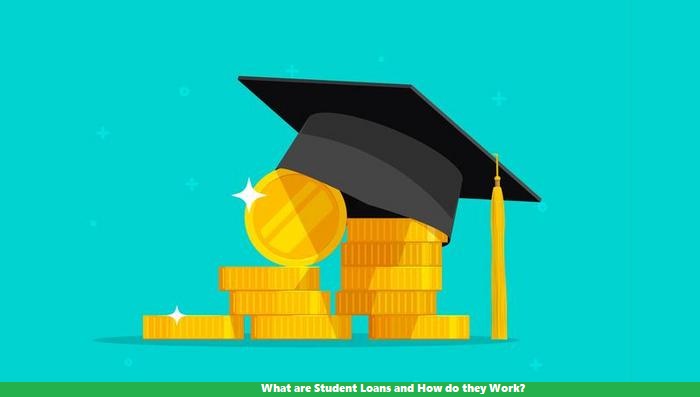After graduating from high school, one of the most common thoughts that comes into various students’ minds is continuing their studies. However, not being able to deal with the education expenses comes in as a big hurdle. Therefore, banks offer student loans to students belonging to different fields and areas to pursue their education without worrying about the expenses. There is a positive and severely negative side to student loans, which every student should know about borrowing money from a bank. To afford your diploma or degree, if you are also thinking of getting a bank student loan, then you should read till the end to get a better understanding of this term.
What are Student Loans?
Apart from scholarships and grants that are fully funded by the government or relevant institutes, a student loan is the amount of payment that most students get from the government or private banks. This amount is generally borrowed by providing the documents as a sign of proof that the lent money will only be used for educational purposes. Many students use this amount to either invest in their degrees, pay the tuition fee, or invest in their educational career by other means. Whatever might be the cause, a student loan can only be granted if it is merely used in the will of education. Unlike scholarships, student loans are meant to be paid back after a specific period of time.
Type of Student Loans
There are numerous types of student loans depending upon the loan plan they choose for themselves. However, in the legal regard, student loans are mainly of two types.
Also read: 7 Factors Need Consideration Before Sanctioning Banks Loans
1: Federal or Public Loan
Any loan provided by the government to its students under some educational scheme or relief is called federal loans. These loans are generally more trustworthy and can be fruitful in the longer run. Interest rates of federal or public loans are comparatively less as compared to loans offered by banks. Many government sector banks also provide several incentive loans to their customers.
2: Private Loans
Loans provided to the students by some private companies or corporations to help them solve their educational expenses are generally termed as private loans. Private Loans have a strict policy of repayment. Once you borrow the amount, you will be required to pay back the borrowed money under specific conditions within a given time period. Nevertheless, private loans could be a fraud. In many cases, private agencies and banks claim to offer public student loans under their names. This malpractice has resulted in exploiting the careers and lives of so many students to achieve their goals. However, a private student loan would generally require you to repay at a larger interest rate. As soon as the money reaches you, you will be required to pay it back without delaying any further in private loans.
Also read: What Happens When You Default on a Loan?
How do Student Loan Works?
To get a Federal loan, a student must fill out a form issued by the government. These forms are available in any bank associated with the government. However, taking a student loan from a federal state is not just restricted to filling a form. There is an entire process of the working of student loans. Student Loans start from collecting the financial information from the student and his parents. From the student’s family’s financial status to the assets they own, every detail has to be precisely mentioned. Once the forms are submitted to the relevant department, the federal government examines every candidate. They get in touch with the student’s school or university and inquire from them about their academic status. If a student qualifies the given criteria, he is then added to the list of selected candidates. The list is then issued according to the tentative dates provided.
All about Promissory Note
Student Loans work in a way through which a student has to sign up for an agreement. Under this contract, a student must promise the repayment of the borrowed money within the given period. This agreement is known as a Student Loan promissory note. Promissory Note serves as legal documentation to limit the repayment pressure and ensure that sanctioning a student loan prevents malpractice.
Options Available for Student Loan Repayment
Once you have been successfully qualified for a student loan, you shall be asked to repay the loan in a systematic order. A student loan usually allows a student to pay the borrowed amount within the next 10-15 years. In comparison to regular loans, student loans offer more relaxation and flexibility to the borrower. After getting granted a loan, a student either starts earning on his own to repay the loan or gets himself financially stabled after completing his degree.
Standard Payment Plan of a Student Loan
A standard payment loan, as mentioned above, gives a time limit of 10 years to the student to pay back the money. However, for a private student loan, the time period can be short. Nevertheless, private student loans also offer a pretty good time limit.
Extended Repayment of a Student Loan
For an extended repayment of a student loan, a student shall be granted an extensive time limit of almost 25 years. This plan is usually provided to people who have fantastic loans of amount more than $30,000. In private banks, an extended repayment option of a student loan is also available under specific conditions.
Is there any Student Loan Forgiveness?
If, by any chance, a student is not able to pay back the money within the given time period, he might be allowed to request a student loan forgiveness. However, this plan could be scary as not all applications are religiously approved.
Also read: Home equity line of credit vs home equity loan
Wrapping Up
Student Loans work in a systematical order. However, for students who cannot afford their overall education expenses, getting a student loan is the best possible option to save yourself from getting exploited.













Add Comment